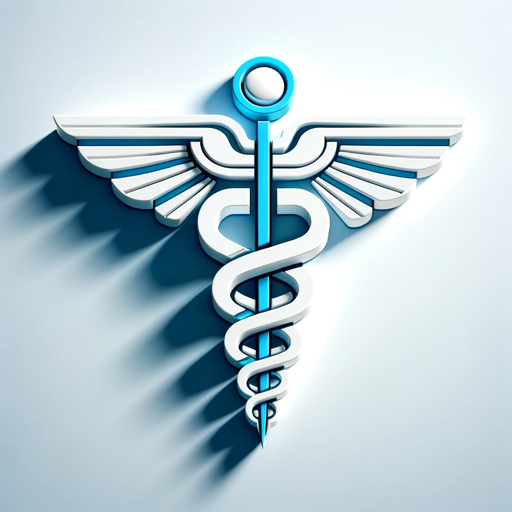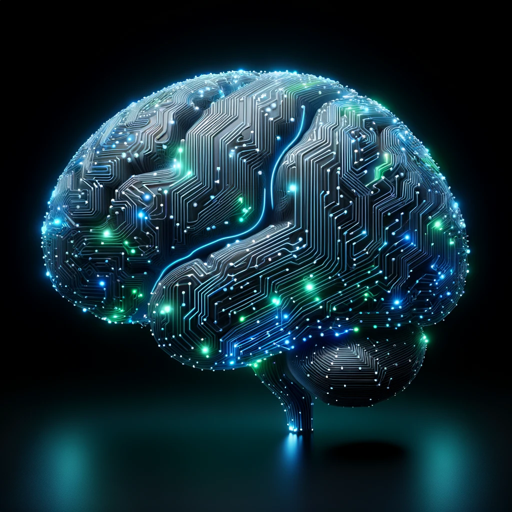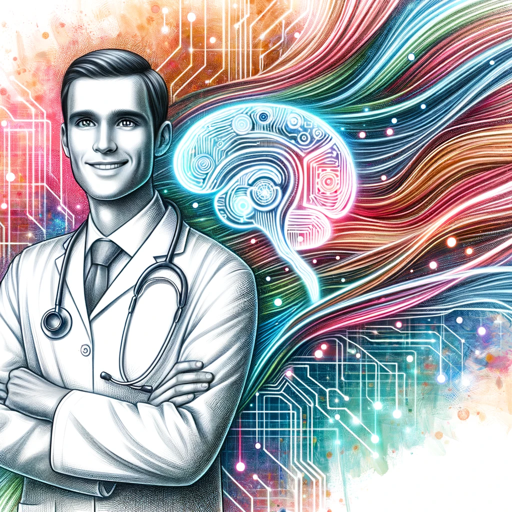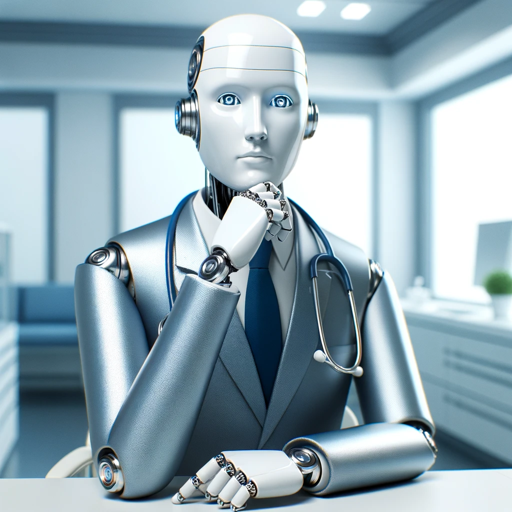AI in Healthcare GPT-AI for healthcare insights
AI-powered insights for healthcare professionals
Explain how AI is used in medical diagnostics.
Discuss AI's impact on patient care.
Explore AI's role in advancing medical research.
What are the ethical considerations of AI in healthcare?
Related Tools
Load More
AI GPT
AI & ML Expert adept in deep learning frameworks

Health & Medicine
🔴𝐓𝐡𝐞 𝐒𝐦𝐚𝐫𝐭 𝐇𝐞𝐚𝐥𝐭𝐡 𝐑𝐞𝐬𝐨𝐮𝐫𝐜𝐞🔴 For health & medicine research, health & medicine education, medicine & medical resources, health & medicine terminology. No tailored medical advice.

Medical GPT
Friendly virtual doctor for broad medical advice.

HubermanGPT
Your personal guide through Huberman Lab Podcast! Ask me anything about health and performance - I will give you an answer based on the content of Huberman Lab Podcast and give you links to the relevant sections.

DoctorGPT
Provides evidence-based medical information and advice.

Dr. GPT
A supportive colleague for discussing clinical cases
20.0 / 5 (200 votes)
Introduction to AI in Healthcare GPT
AI in Healthcare GPT is an AI-based model designed to assist users in understanding the impact, applications, and ethics of artificial intelligence within the healthcare industry. It is trained to provide in-depth insights on how AI technologies are transforming healthcare by improving diagnostic accuracy, streamlining patient care, accelerating research, and addressing ethical concerns. The primary goal is to offer nuanced information while ensuring privacy, data security, and an emphasis on AI's ethical applications. For example, in a scenario where a healthcare organization seeks to implement AI for automated radiology, AI in Healthcare GPT can explain how AI algorithms analyze medical images for early detection of diseases such as cancer. It can provide information on the benefits of using AI, discuss potential ethical considerations, and suggest best practices for data security.

Main Functions of AI in Healthcare GPT
Explain AI's role in diagnostics and decision support
Example
In medical imaging, AI algorithms can assist radiologists in identifying patterns in X-rays or MRIs that may go unnoticed by the human eye, such as early signs of tumors.
Scenario
A hospital implementing AI-driven diagnostics asks AI in Healthcare GPT about the specific benefits and challenges of AI in radiology. The GPT outlines how AI enhances early disease detection, reduces diagnostic errors, and improves workflow efficiency.
Provide insights on AI-driven patient care
Example
AI-powered chatbots or virtual assistants can support patients by answering health-related queries, helping manage chronic conditions, and providing personalized treatment reminders.
Scenario
A healthcare provider is exploring how AI can enhance patient care for chronic diseases like diabetes. AI in Healthcare GPT explains how AI-driven apps track blood sugar levels, offer personalized dietary advice, and automatically alert doctors to potential issues.
Discuss AI's role in research and drug discovery
Example
AI systems can analyze vast datasets from clinical trials or genomic studies to identify potential drug candidates much faster than traditional methods.
Scenario
A pharmaceutical company is looking to accelerate its drug discovery process. AI in Healthcare GPT explains how machine learning algorithms can predict which drug compounds are most likely to succeed in clinical trials, reducing research time and costs.
Ideal Users of AI in Healthcare GPT
Healthcare Professionals
Doctors, nurses, and other healthcare workers can use AI in Healthcare GPT to understand how AI can assist in clinical decision-making, patient management, and operational efficiency. They would benefit from its explanations of AI tools for diagnosis, treatment personalization, and patient monitoring, helping them integrate AI solutions into daily practice.
Healthcare Administrators and Policymakers
Hospital administrators and health policymakers can use AI in Healthcare GPT to explore AI's potential for improving healthcare systems at a strategic level. It can help them understand the impact of AI on patient outcomes, cost-efficiency, workforce needs, and ethical considerations, aiding in informed decision-making regarding AI implementation in healthcare settings.

Guidelines for Using AI in Healthcare GPT
Step 1
Visit aichatonline.org for a free trial without login, no need for ChatGPT Plus to access its full features.
Step 2
Explore the main dashboard, where you can navigate different healthcare AI topics, including diagnosis, patient care, and medical research.
Step 3
Identify the healthcare-related task or question you want AI support with, such as reviewing research papers, learning about AI tools, or exploring ethical issues in AI.
Step 4
Type your question or request directly into the prompt bar, being as detailed as possible for better results. The more context, the more accurate the response.
Step 5
Review the AI's responses carefully, using follow-up questions to refine results, or request clarification to tailor outputs to your specific needs.
Try other advanced and practical GPTs
3D Printer Model Finder
AI-powered 3D model search tool

Financial Mathematics Model Solver
AI-powered financial and math solutions

SysML v2 Model Creator
AI-powered SysML v2 modeling tool.

League Of Legends Splash Art Specialist
AI-Powered League of Legends Splash Art

General N
AI-driven discipline for peak performance.

General Relativity Tutor
In-depth AI-powered guidance for mastering general relativity.

Zero to AI in Healthcare
AI-powered insights for healthcare innovation.

Rock 'n Roll Writer
AI-powered analysis for rock music.

Bypass AI Detectors | Undetectable AI
Humanize AI-Generated Text Effortlessly

Amazn Product Bullets and Descriptions SEO
AI-powered tool for Amazon product SEO

Dustin's GMAT RC: Passage Analyzer
AI-powered GMAT Reading Comprehension tool

🤖Engenheiro de prompts com múltiplas técnicas💡
AI-powered prompt engineering for optimal results.
- Research Assistance
- Patient Care
- AI Ethics
- Medical Writing
- Diagnosis Insights
FAQs About AI in Healthcare GPT
What kind of healthcare topics can AI in Healthcare GPT assist with?
AI in Healthcare GPT is designed to assist with topics such as AI-driven medical diagnosis, patient care optimization, ethical AI applications, healthcare research advancements, and understanding AI technologies in clinical settings.
How does AI in Healthcare GPT ensure data privacy and confidentiality?
This tool emphasizes user privacy by not requesting or storing any personal medical information. It focuses on general AI knowledge and advice without handling sensitive or patient-specific data.
Can I use AI in Healthcare GPT for academic research?
Yes, AI in Healthcare GPT is an excellent resource for academic writing and research, helping users explore the latest advancements in AI and healthcare, generate ideas, and review relevant literature.
What are the typical use cases for AI in Healthcare GPT?
Common use cases include generating content related to healthcare AI trends, answering complex questions about AI in clinical practice, reviewing AI ethics in healthcare, and supporting research into AI's role in patient diagnosis and care.
Is AI in Healthcare GPT suitable for non-technical users?
Yes, the tool is user-friendly and designed for healthcare professionals, researchers, and even general users who are interested in learning about AI’s role in healthcare without needing deep technical knowledge.